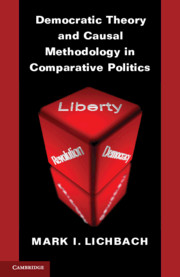1 - Methodology’s Problem, and Democracy’s Too
Published online by Cambridge University Press: 05 May 2013
Summary
People fight for democracy. The fall of communisms, the Color Revolutions, and the Arab Spring are recent popular struggles about democratization. If collective human agency causes democracy, two questions arise: what type of democracy do people want? How is their collective agency causal for democracy?
Comparativists studying democratization advocate democratic theories and advance causal methodologies. This book will discern an elective affinity of theory and method. The Moore Curve – the more external the causal methodology, the thinner the democratic theory – governs democratization studies. However, most comparativists never stop to reflect on the relationship between normative and empirical questions of collective human agency. They inevitably slight concerns about how their prescriptive theories and descriptive methods cohere.
The way forward in comparative politics to more fully anthropomorphize people and insert them into the ought/is debate. Desired outcomes Y face the opportunities and constraints of historical conditions X. To deepen normative appreciation and empirical understanding of democracy, to join why-Y normative visions of democracy with if-X-then-Y causal models of democracy, comparativists should thicken their conceptions of collective human agency. Complexifying agency allows comparativists to reconcile different normative theories of democracy with different empirical approaches to causality.
- Type
- Chapter
- Information
- Publisher: Cambridge University PressPrint publication year: 2013

